In a matter of weeks, our lives went from in-person to remote, from living on campus to having to move out of our dorms, from playing the sports we love to calling it a season early, from living freely and hanging out in big groups to sheltering in place. As we reach the one-year anniversary of Covid-19’s impact on the U.S. let’s reflect on the Vanguard community’s resilience in this season of great uncertainty.
It all began on March 12 when President Michael Beals sent an email to the entire student body stating that spring break would be extended a week with the possibility of moving to remote learning. Less than a week later, on March 16, another email was sent to confirm that classes were moving to an online format with residence halls remaining open. From there, it was only a matter of days until the once-bustling Vanguard campus sat eerily empty. A year later, while some staff and students have returned to campus, Covid-19 continues to leave its silent mark on 55 Fair Drive.
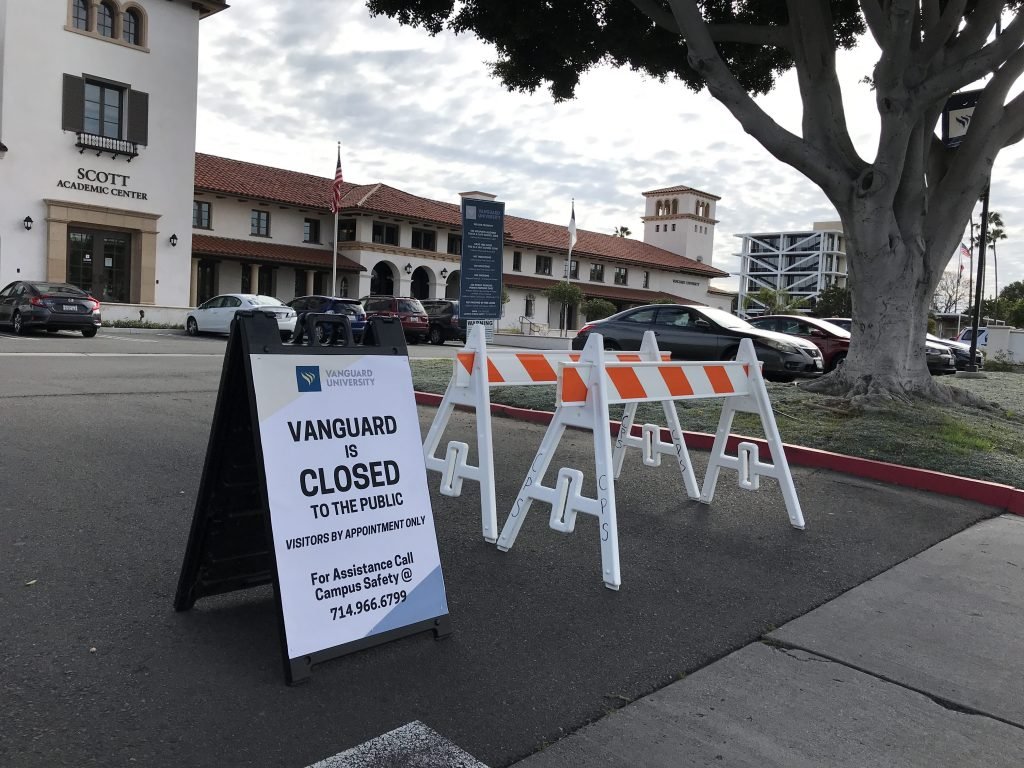
Residence Life
Shelley Youd, Director of Residence Life, was in President Beals’ office on the morning of March 17. She remembers popping a bag of popcorn while a few university officials discussed how to protect students who call Vanguard their one and only residence.
“The heart of our institution as a whole is that we will provide always what is best for our students and that we will care for them,” Youd said.
While Vanguard hoped to keep residence halls open during the pandemic, Orange County’s newly issued stay-at-home order forced the administrators to change course. A new email was sent out saying that all students had to move off campus by, Friday, March 20.
Students living in campus residence halls were able to petition to stay on campus due to extenuating circumstances. Most of these petitions were denied. 32 students were permitted to live in the dorms for the rest of the spring semester.
Youd described the months between March and August as a crazy yo-yo. Without much guidance from the State or the CDC, the university had to figure out how to care for the students living on campus during the most extreme weeks of the lockdown.
After hearing about how other institutions were treating their students in isolation, Youd made sure Vanguard students had the most comfortable experience possible. Each isolation room was prepped with a linen kit with full sheets and pillows, towels, thermometer, basic needs, wipes, hand sanitizer, and mask. Students in isolation received three meals a day from the Bruce Lindsey Cafe, regardless of their meal plan, and other food supplies from the Living Well food pantry.
In the fall of 2020, campus housing opened with limited capacity. Coronavirus protocols included no visiting hours, filling out a daily health screening via the Titan app, wearing a mask, and not having anyone but roommates inside dorm rooms.
One bright side to the dorm closures is that residence life was able to complete many projects which could have not happened with students on campus. During the summer, Laguna, Huntington, and Balport received new furniture, the Towers lobby was revamped, and the outside of the Towers received a facelift with new paint and windows.
At Vanguard Center, windows were replaced and the common meeting place, “The Wedge,” got a remodel.
Many parts of normal residence lift became digital. Mandatory floor meetings took place on Zoom. Information was sent out via Canvas. Youd sees the possibility of keeping these two digital formats in a post-Covid era.
Another major change to residence life due to COVID-19 is the ability to register for housing and pay the housing deposit later. Youd is hoping to keep that around so students are able to get their ideal housing situation. In the past students would have to submit their housing deposit prior to applying, sometimes preventing those with financial burdens from rooming with their friends.
Campus Safety
Kent Ferrin, Director of Campus Safety, explained that every campus has a plan to respond to pandemics like a measles outbreak on campus, but no one was prepared for COVID-19.
“As the goal posts move, one thing we’ve had to learn is how to be super flexible,” Ferrin said.
The first challenge that campus safety faced was closing campus by limiting guests and prohibiting pedestrians. All entrances were barricaded with one designated entry spot on Vanguard Way. Campus safety began requiring everyone on campus to complete a daily health screen on a mobile application called Titan.
With campus empty, campus safety had to prevent trespassers from taking refuge in areas that are usually occupied by students. The increase in monitoring campus required the purchase of additional cameras.
Ferrin hopes the campus will continue to utilize the Titan app in a post-COVID-19 era to report suspicious activities and make sure students are protected on campus.
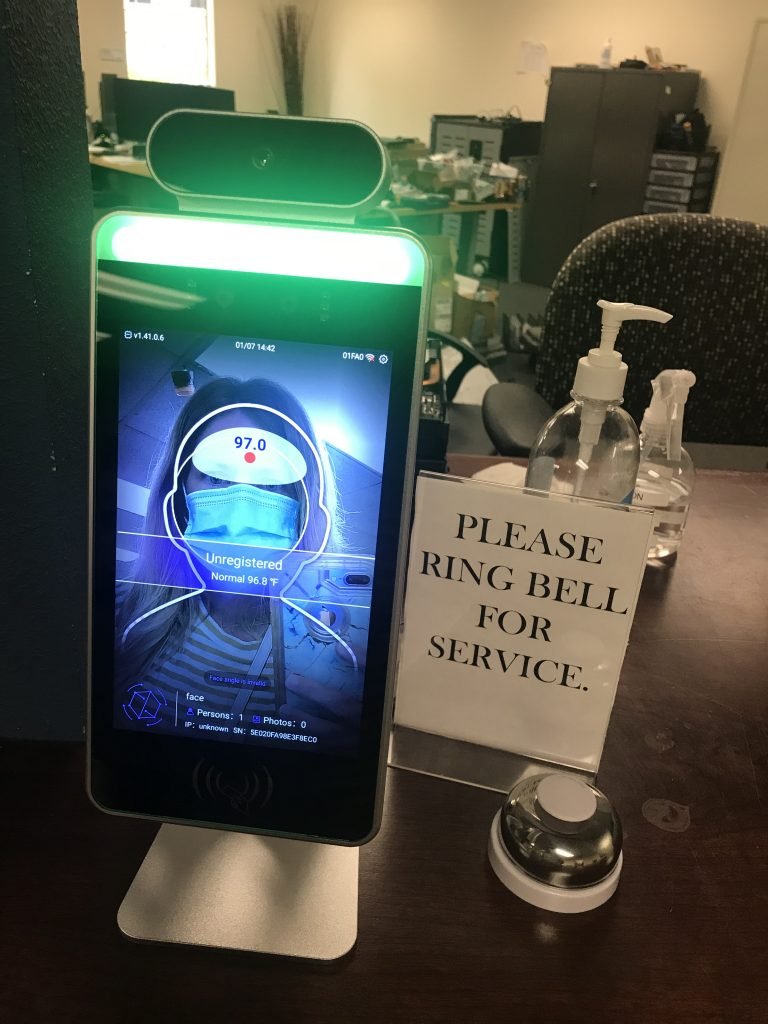
Academics
Spring break was extended to two weeks to give the University time to assess the emerging COVID-19 pandemic and the administration quickly made the decision to switch to remote instruction for the duration of the semester.
Dr. Mike Wilson, the Associate Provost and Dean of the College, said the immediate priority was to help all the faculty use existing technology to transfer their in-person courses to remote delivery.
The Institute for Faculty Development led by Dr. Bonni Stachowiak, Dean of Teaching and Learning, and Dr. David Rhoads, Director of Teaching Excellence and Digital Pedagogy, was instrumental in sharing best practices for online classes. Some faculty had taught online in the past but for others, it was a completely new experience.
Faculty members had to grapple with how to measure learning in this online environment. “We want to move away from this assumption that sitting in class means you are engaged… we know that’s not true,” Wilson said. He suggests that some classes might not meet on Zoom but rather ask students to engage in meaningful activities related to the course learning objectives.
The summer was a time for faculty to ramp up and improve remote instruction, which Wilson described as the biggest challenge for the summer. The standard for the fall courses was heightened.
“Zoom fatigue” quickly became a problem for faculty and students.
The number one challenge that faculty found with Zoom courses is facing a class where students have their cameras off and muted. “You’re speaking to a dark room and you don’t get interaction,” Wilson expressed with a laugh. He described it as jarring when he could not hear or see students laugh at his jokes while teaching a U.S. History course.
The term “busy work” was thrown around a lot by students. Some felt that the faculty was overcompensating for lack of personal interaction by giving students more work. However, the faculty was sensitive to the needs of the students, understanding that many students faced challenges while studying at home such as having a poor internet connection or having to help with younger siblings during school hours.
In spring 2021, classes were relabeled as synchronous, asynchronous, or a combination of hybrid and flexible (hyflex). Synchronous is when a class is delivered in real-time typically over Zoom. Asynchronous is a course without a set meeting time where students go through content independently. Hyflex is when a student takes a course in-person but has the flexibility to stay home and access course content online as needed.
The university does not see hyflex going away in the future and may expand course delivery options to all students, including traditional undergraduates. There is hope for a significant return to campus for faculty and students for the Fall 2021 semester.
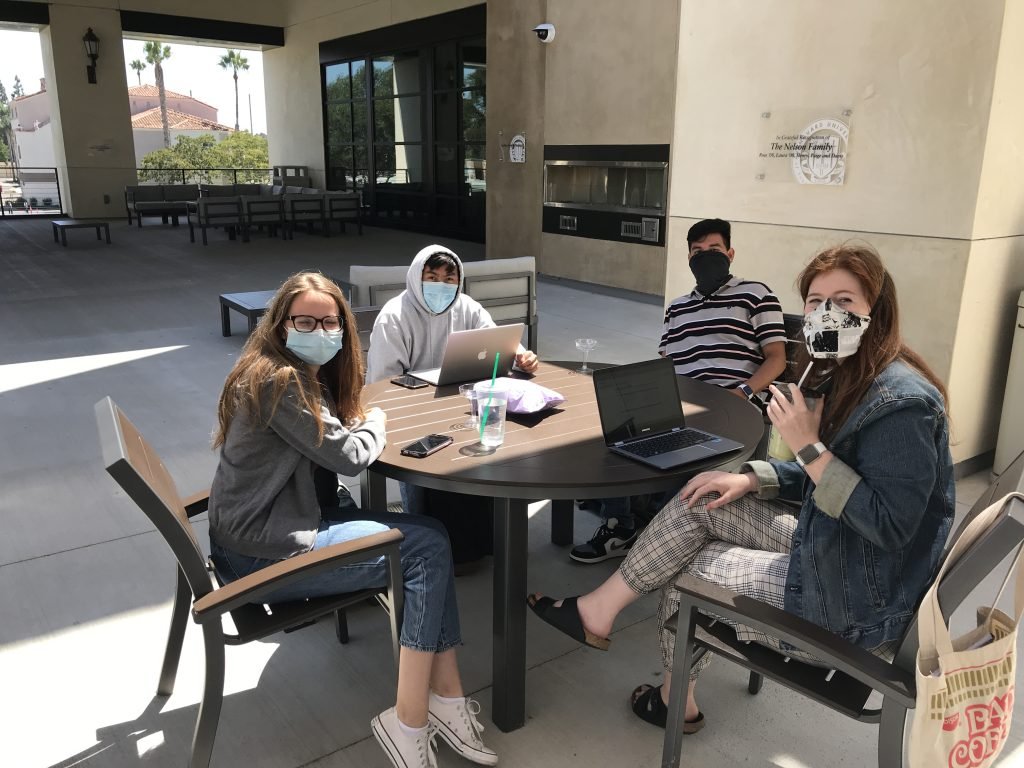
Spiritual Formation
On March 12, 2020, students made their way to a community chapel in the Heath Forum but were met with signs saying that in-person chapels had been canceled until further notice. University Pastor and Dean of Spiritual Formation, Michael Whitford, had to rush over minutes before chapel began to put the signs up and tell the worship band that chapel was canceled.
Pastor Whitford and his staff went into overdrive thinking about how they could do chapels in a completely online format. Their first step was to create a spiritual formation department (SFD) YouTube channel. SFD also used Zoom and began to alternate between live Zoom chapels and pre-recorded worship. One of the biggest impacts of COVID was, “our inability to have tactile in-person worship together where two or three gathered in the name of Jesus,” Whitford said.
For years, SFD had considered making video recordings of chapel and the pandemic made that goal a reality. Audio recordings are now a thing of the past for SFD and they will continue to have a video component moving forward.
Students proved their chapel attendance by filling out a Wufoo form. At first, these forms were complicated with a long word count requirement but SFD has since simplified the process and cut the length. SFD staff read through these forms to ensure that students engaged with the chapel before awarding credits for attendance. Although it takes a while to get through the forms, the administrative team enjoys reading the prayer requests and interceding on behalf of the students.
Since the fall of 2020, students have only had to attend 15 chapels instead of the regular 30 to make the requirement more feasible for students. Wednesday morning chapels are in-person for students approved to be on-campus and pastoral care is available via Zoom.
Pastor Mike is excited about utilizing online chapels in the future to bring in world-renowned speakers from around the globe. However, he can’t wait until students are all in-person once again.
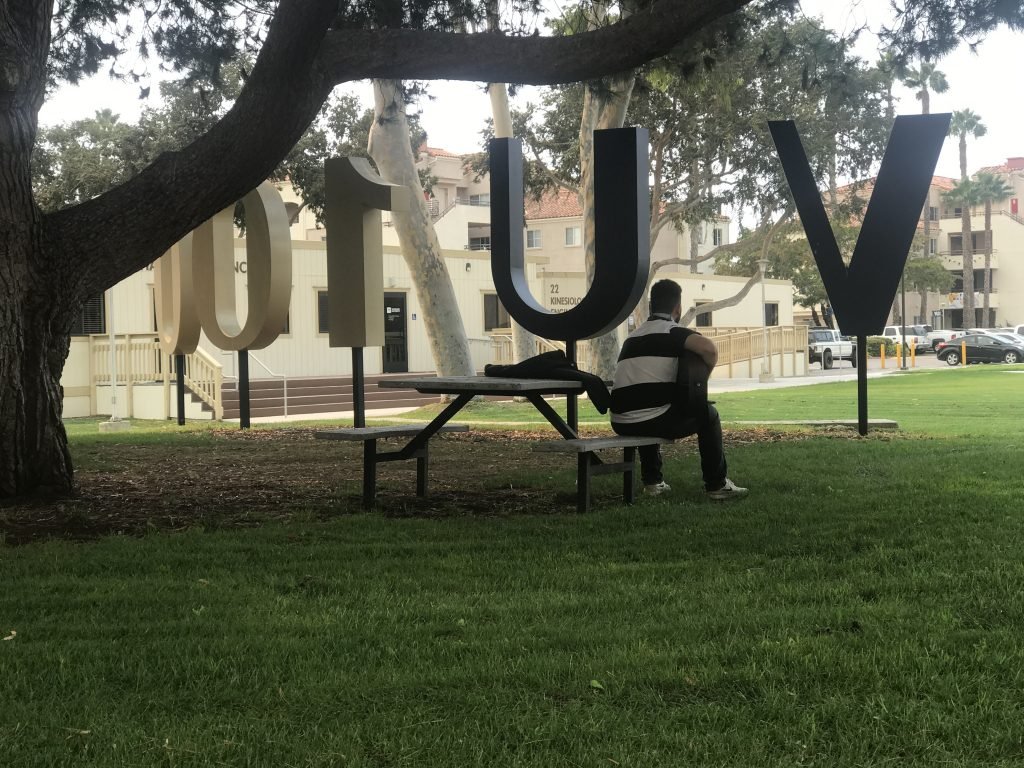
Athletics
The softball team was on the road to an away game when their season was put on hold. Women’s basketball had just booked flights to the national tournament. Baseball and men’s volleyball were enjoying the start to a great season.
Jeff Bussell, Director of Athletics, knew that once the NBA shut down, there were going to be major adjustments at the college-level. Athletic teams moved from practices in-person to workouts and team meetings on Zoom.
New testing protocols for athletes were put into place in the fall of 2020 after the National Association of Intercollegiate Athletics (NAIA) and National Collegiate Athletic Association (NCAA) came out with guidelines in late July and early August.
Athletes get screened every day using the Titan app and with temperature checks when they arrive to practice. Athletes in high contact sports such as basketball and wrestling get tested three times a week. 25% of the athletes in low contact sports such as baseball, softball, soccer, and volleyball get tested once a week on a rotating basis.
The University made the decision to make athletes wear a mask during practice. Buses are being used more than vans to allow for physical distancing between teammates. All regular-season games have been scheduled locally, eliminating traveling in planes. Cleaning protocols have been increased as well. No fans are allowed at games or practices.
Those who were seniors in the spring of 2020 were allowed one more year of eligibility. Since fall sports were delayed, all 18 sports programs are now in competition. The Athletic Department started the Vanguard Sports Network to allow fans to watch every game live or on-demand.
University Enrollment
Despite the global pandemic, the fall 2020 enrollment was the biggest in Vanguard’s history for traditional undergraduate students and for the incoming freshman class.
“That was all the Lord,” Associate Director of Undergraduate Admissions, Karen Benitez said.
On the eve of March 19, during the most important part of the annual enrollment cycle, members of the admission staff gathered in the Scott Academic building to prepare for what was ahead. They put together bins of file applications and counted out postage stamps, tasks that would help them do their jobs remotely.
The admission staff remained motivated by checking in with each other twice a day, first thing in the morning and after lunch.
“We were able to celebrate with each other and with students when they made their decision and submitted their deposit,” Vice President for Enrollment Management, Kim Johnson said. The staff would call up newly-enrolled students and congratulate them over the phone.
During the summer, the admissions team did all operations in-person with COVID protocols in place but that all changed Nov. 18 when another stay-at-home was issued until Feb. 1.
Over the winter, Admissions engaged with prospective students by hosting live tours on Zoom and virtual meetings with admission counselors. In-person visits are slowly resuming on campus. Tours are currently available one household at a time.
Conclusion
Vanguard has been committed to supporting students throughout this time of uncertainty, never wavering in its pursuit of truth, virtue, service, even when that mission must be carried out online. The administration looks forward to returning to campus next year with a renewed sense of gratefulness and some surprising innovation that was born in the midst of a global pandemic.

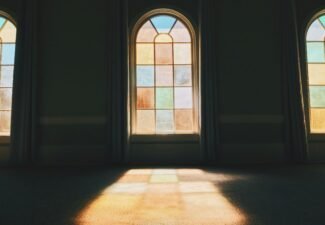 The Liturgical Calendar: Should Christians Observe It?
The Liturgical Calendar: Should Christians Observe It? Embracing Authenticity in the Pursuit of Success: A Reflection on Journalism, Education, and Meaningful Academia
Embracing Authenticity in the Pursuit of Success: A Reflection on Journalism, Education, and Meaningful Academia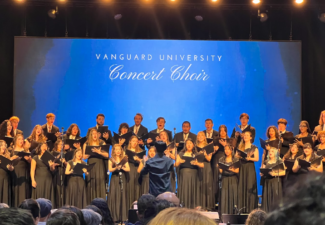 Spring Concert: Music From Around the World
Spring Concert: Music From Around the World Recycling on College Campuses
Recycling on College Campuses
Thank you, Joe, for writing this detailed article about Vanguard’s adaptations, challenges, and triumphs during the Covid-19 pandemic.